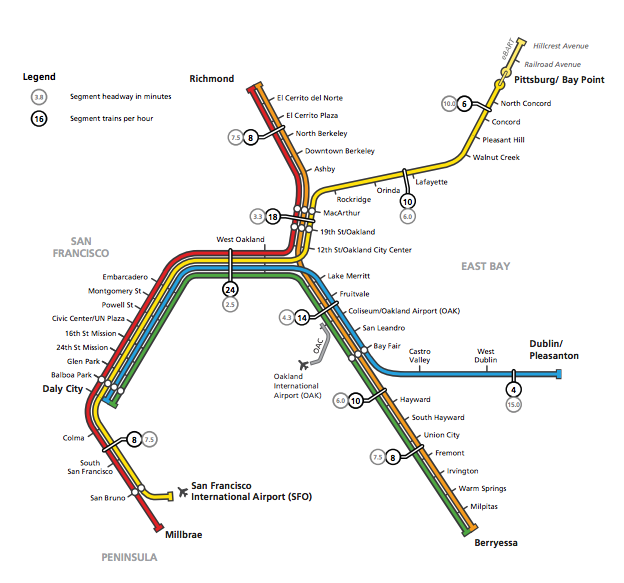Fares on BART extension to San Jose reflect agency fragmentation, not customer needs
Despite being an important transfer point between VTA Light Rail and BART, passengers transferring at Milpitas station will pay a different fare depending on which way they are traveling.
The new fare structure for the BART Silicon Valley extension shows some of the seams in the regions fare system, reflecting a logic that makes sense as a strategy to balance transit agency budgets, but not a system that is in the best interest of customers. The new fare structure is both complicated to understand and unaffordable to many transit users, and will likely suppress potential transit ridership for the new extension.
Passengers transferring from BART in Santa Clara County to VTA bus or light rail will get a $.50 discount. But passengers traveling in the opposite direction from VTA to BART do not get any discount.
The asymmetry is worse for students and workers who use a VTA Smartpass allowing them to use VTA local service without charge. Today, a student who lives in Fremont pays a $2.50 surcharge for the 181 express bus that takes them from near the University to the Warm Springs/South Fremont station. Once the line opens, the student will take the 500 bus from City Hall and transfer at Berryessa; the trip will cost $3.70, an extra $2.40 per day over the price prior to the BART extension. Considering how many San Jose state students are food insecure, this fare increase could mean hardship for cash-strapped students.
Excerpt from VTA’s New Service Plan map anticipating the opening of Milpitas and Berryessa BART Stations in 2020. See full map.
The explanation for these pricing asymmetries is that BART's budget works differently than VTA's budget - fare revenue makes up over 70% of BART’s operating budget compared to less than 10% for VTA. So BART frowns on offering a transfer discount or student discount that could negatively impact their budget. The consequence is that a short trip costs 10% more northbound than southbound, which is confusing and nonsensical for customers, and college students need to pay nearly double for the same trip.
Imagine a world where a trip cost the same price northbound and southbound. Imagine a world where discounts were designed around customers; considering the special needs of college students.
The new, means-based discount program for BART won’t address the issue that still costs more to travel northbound than southbound, and even the 20% means-based discount on BART would still leave the student paying more than before. Hopefully, issues such as this will be considered as part of the regional fare integration study that is moving ahead.
Expanded BART system map base case service plan showing the new Milpitas and Berryessa stations, from BART’s 2013 Sustainable Communities Operations Analysis.
Despite numerous delays, the BART extension into Santa Clara County will eventually open, with new stations at Milpitas and Berryessa becoming operational sometime in 2020. However, the planning and delivery of this extension has been plagued with problems that originate from the fact that the BART Special District only covers three counties - San Francisco, Alameda, and Contra Costa, and fares are based on the different budget structures of different modes, rather than based on customer trips. Going forward, the region has the opportunity to improve the organization of the region’s transit system to reflect our growing and increasingly interconnected region, and the needs of riders with trips using trains and buses together.



